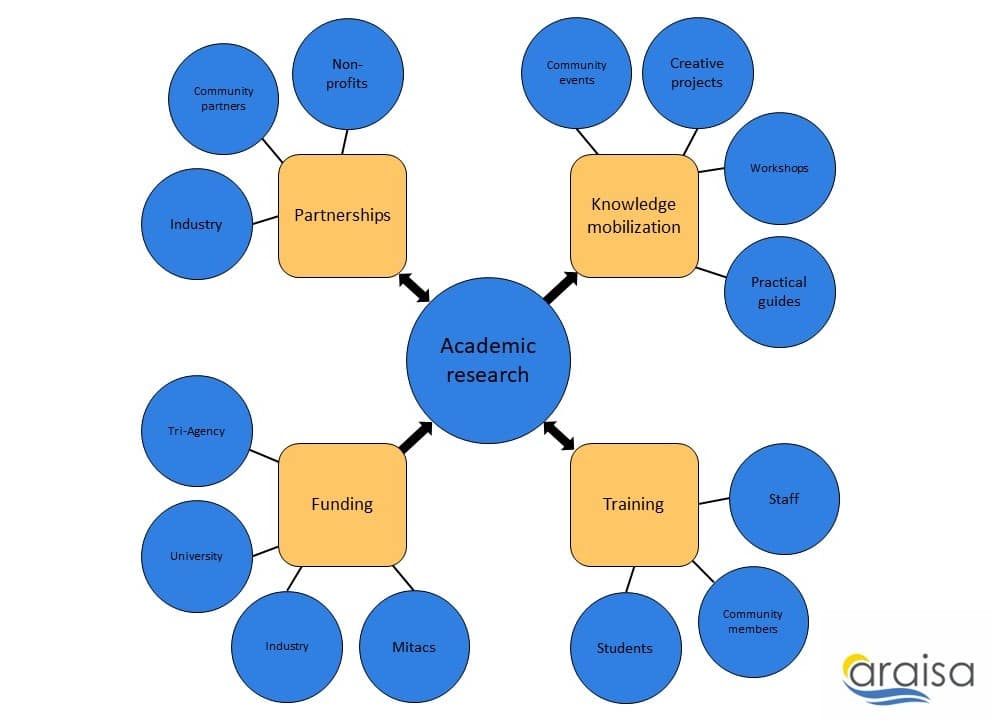Partnerships for Academic Research – Funding, Training, and Mobilizing
May 22, 2024

It is especially useful to know about academic funding streams, the importance of training and community involvement, and the scope of knowledge mobilization activities.
Your organization likely has been or will be approached to participate in academic research. This can range from small projects led by graduate students to much larger ones involving faculty at multiple universities. Researchers may want to speak with staff, engage with service users, or dig through organizational archives. Some organizations, such as the Association for New Canadians, have formal policies for research while others take an ad hoc approach.
There are many factors to consider when deciding to participate in academic research: How will the research benefit your organization and newcomer communities? How will it enhance knowledge of the sector? Does your organization have the capacity to be involved? To answer these questions, it is useful to understand the landscape of academic research. It is especially useful to know about academic funding streams, the importance of training and community involvement, and the scope of knowledge mobilization activities.
Funding
The Tri-Agency has clear guidelines for research funding which reflect the important role of non-profit and community organizations.
Academic research in Canada is largely funded by the Tri-Agency (or Tri-Council): SSHRC, which funds research in the humanities and social sciences; CIHR, which funds health research; and NSERC, which funds research related to engineering and the natural sciences. Each agency has a variety of programs to support original research and activities related to knowledge-sharing. While SSHRC is especially likely to support immigration-related research, SPOs may be invited to participate in projects supported by any of these agencies.
The Tri-Agency has clear guidelines for research funding which reflect the important role of non-profit and community organizations. It aims to support research in a way that does not place undue burden on partner organizations. For example, some funding programs permit a salary research allowance for non-profits that are committing significant time or resources to a project. According to SSHRC, a salary research allowance is “to help compensate for the time an employee will spend participating in a SSHRC-funded research project. Applicants can apply for up to 50% of the annual salary of the person who is to be replaced to cover the percentage of time that person will be devoting to the project.”
Training
Canadian funding agencies view training as an essential part of the research process.
Canadian funding agencies view training as an essential part of the research process. Most research projects will therefore find ways to actively integrate training and mentoring opportunities for students, practitioners, emerging scholars, and community members. This can involve hiring students as research assistants, engaging non-profit staff as co-investigators, or involving community members as subject matter experts. Researchers should build wages (for students) and honoraria (for experts and community consultants) into the research plan and budget. The CARFAC-RAAV Minimum Recommended Fee Schedule can be a useful guide when determining honorarium rates.
Some funding agencies, such as Mitacs, focus primarily on skills training through partnerships between academia and industry. Mitacs programs support paid internships; research and training activities; and partnerships between students, researchers, non-profits, business, and government. They are committed to innovation within the non-profit sector, and Mitacs can be an especially vital resource for SPOs that offer services related to employment and skills development.
Knowledge dissemination and mobilization
Knowledge mobilization – sharing research in accessible and practical formats – is crucial to the research process. When research involves non-profit or community partners, each organization will have its own needs and expectations. Research outputs should meet these varied needs. For example, SSHRC funds traditional research activities and conferences; but it also funds a range of other activities such as creative projects, workshops, and community events. This can include practical tools and resources to support the settlement and integration of newcomers. SSHRC has a broad definition of knowledge mobilization and shares resources to support these activities.
Academic research can meaningfully engage with scholars as well as non-profits, community organizations, and the populations they represent. As such, there is considerable flexibility to how SPOs can participate in and benefit from research. An effective project will answer the researchers’ questions while providing concrete benefits to SPOs and their service users.


About the Author
Jason Chalmers
Jason Chalmers holds a PhD in Sociology from the University of Alberta and was a Postdoctoral Fellow in the School of Community and Public Affairs at Concordia University. As an interdisciplinary researcher, Jason draws on diverse methodologies and is particularly inspired by creative and community-based practice. Jason’s research interests include Canada’s immigration history, Indigenous-settler relations, and social inequality.
You can reach Jason at jchalmers@araisa.ca
